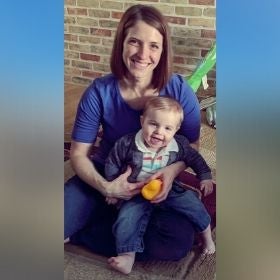Several Ascension Wisconsin facilities are breast milk donor depots for mothers from Milwaukee, Racine, Ozaukee and Portage counties.
Mothers donate breast milk to the donor depots, which is then collected from area hospitals by the Mothers Milk Bank of the Western Great Lakes in Elk Grove Village, Illinois. There, it is processed and distributed to hospitals in Wisconsin and Illinois that treat sick infants in their neonatal intensive care units (NICUs).
Ascension Columbia St. Mary’s Hospital campuses in Milwaukee and Ozaukee, Ascension All Saints Hospital in Racine, and Ascension St. Michael’s Hospital in Stevens Point are milk donor depots.
“We really want to spread the awareness to mothers that they can donate to the milk bank,” said Karen Strube, RN, an internationally board-certified lactation consultant for Ascension Columbia St. Mary’s Hospital Ozaukee. “Some women in the NICU are unable to breastfeed, some are on medication that would be harmful for their baby and others simply don’t produce enough milk. In these cases, breast milk donations are extremely important.”
The program at Ascension Columbia St. Mary’s Ozaukee received more than 3,000 ounces of milk in 2018 and then collected more than 15,000 ounces of door milk from 14 donors in 2019.
“The application process was easy – questions over the phone with a milk bank representative followed by a paper form reiterating what we had discussed over the phone, and then a simple blood draw that was set up and paid for by the milk bank,” said donor mom Laura Mersenski. “I have donated just over 2,500 ounces. While there was a part of me that was anxious to give so much of my milk away – it was a lot of hard work to accumulate all that extra milk, after all – I am so happy to help moms and babies in the NICU. I know those miracle babies in the NICU need it more than we do.”
The benefits of breast milk are numerous and well established. Breast-fed children are more resistant to disease and infection and they are less likely to contract some diseases later in life, including juvenile diabetes, multiple sclerosis, heart disease and cancer. Many unique nutrients in breast milk cannot be replicated by infant formula.
“I never could have imagined this is where our breastfeeding journey would take us, but I am so proud of it,” Laura said.
Mothers interested in donating their milk can contact the milk bank directly. To become an approved donor, women must take a free blood test administered by the milk bank and agree to donate a minimum of 100 ounces of milk. The milk bank supplies the milk bags and bottles. Women can drop their donor milk off at whichever depot is most convenient to them. A courier picks up milk from the hospital every two weeks.
Photo: Milk donor Laura Mersenski and her son, Kyle.




